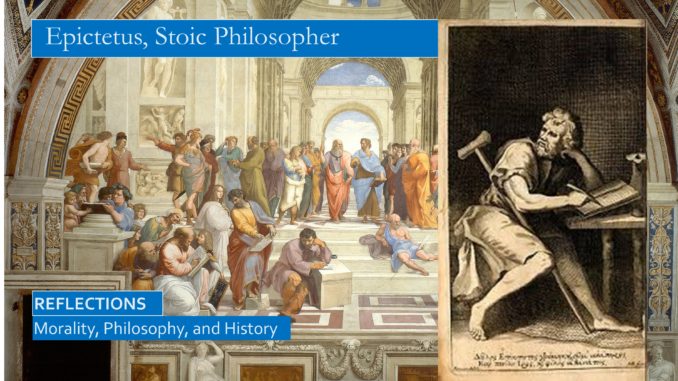
Outside of Scriptures, the most amazing writings I have read are those of the ancient Greek philosopher, Epictetus. The writings of Epictetus are accessible and easy to read, consisting of one maxim after another, resembling the teachings of the early Church Fathers in the Philokalia, echoing many of sayings in the Gospels and Epistles of St Paul. If you want to truly understand the writings of the Church Fathers and the New Testament, you need to have a deep understanding of the Old Testament, but the apostles and St Paul and the Church Fathers also draw from the moral teachings of the stoic moral philosophers best represented by Epictetus. If you compare the New Testament to the Old Testament, the Pauline Epistles to the Gospels, and the writings of the early Church Fathers to Scripture, and sense a shift of emphasis and content, read the Greek Stoic philosophers, they are the rich soil into which the Gospel was sown.
YouTube video for blogs 1 and 2: https://youtu.be/Dhd543kov-E
YouTube script with more book links: https://www.slideshare.net/BruceStrom1/epictetus-favored-roman-stoic-philosopher
To Epictetus, only the good can be truly happy, only the good can truly be free, tyrants may take all you own, but they can never take your most prized possession, your freedom of will; tyrants can throw you in jail, but they can never take away the freedom of your mind; tyrants can take your life, but they can never have your soul. Epictetus, the great philosopher of freedom, was a former slave, a slave to a freed man, and was both poor and a cripple, eking out a living by teaching philosophy. Epictetus was not wealthy like Plato, Epictetus was closer to Jesus in social status, and like Jesus many of his teachings teach the common man how to live a godly life. Epictetus lived shortly before St Paul, close enough that it is doubtful they directly influenced each other, but like the Church Fathers Epictetus did not seek to teach original teachings, but rather repeated in his own distinctive fashion the teachings of the stoic philosophers who preceded him.
I first learned of Epictetus from a series of Teaching Company lectures on Greek Moral Philosophers by Professor Timothy Luke. He had perchance picked up a book containing the writings of Epictetus from a used book store and was deeply influenced by his teachings. Like Socrates, Epictetus did not write anything, his works are classroom notes transcribed by his students. Although Epictetus and the moral philosophers did not challenge the polytheistic religion with Zeus and Hera and the other Olympic Gods, they devised a philosophical monotheism, where the various deities were differing expressions of a Prime Mover, sometimes referring to the “God who is the father of men and of gods,”[1] sometimes referring to Zeus as the main god. Most of the early Church Fathers did not deny the existence of the Greek gods, but instead believed they were demons. In this blog I will follow the convention that when Epictetus refers to the gods plural, I may alter that to God where this does not strain his meaning.
How should the true stoic face the storm when he is on a ship in the middle of the sea, what should he do when the storm surges and the ship sinks. Epictetus tells us how to face the sinking ships in the surging storm, “I do the only thing I can, I don’t drown full of fear, I don’t dare drown screaming or blaming God, but I down knowing that all living things must one day perish, for I am not an immortal being, but a man, a part of the whole as an hour is a part of the day. What difference does it make to me how I pass away, whether by drowning or by a fever?”[2] Thus stoicism is not a philosophy of gloom and doom and the stiff upper lip no matter what, but rather waves of boundless optimism that crash and wash over whatever challenges life brings forth, thankfulness and praise and a smile for both good times and the misfortunes that strengthen us.
Epictetus warns us that men should not behave like animals. “It is enough for animals to eat and drink and copulate and all the other things they do. But for us men, to whom God has gifted the intellect, these things are not sufficient, for unless we act in a proper and orderly manner according to our nature, we shall never attain our true end.” God has a purpose for each animal, some to be eaten, some to pull a plow, some to supply milk and cheese, and other uses. But man was intended to be a “spectator of God and His works, not only a spectator, but also an interpreter. For this reason, it is shameful for man to begin and end where irrational animals do; but rather man ought to begin where they begin, and to end where nature should end, in contemplation and understanding.”[3]
If a student dares to ask him why bad things happen to good people, Epictetus may box him in the ear. “Are you not scorched by the rain? Are you not pressed by the crowd? Are you not wet when it rains?” Has not the Lord granted you the strength to endure all the trial life may bring? “Have you not received greatness of soul? Have you not received manliness? Have you not received endurance? Why trouble yourself about anything if you possess greatness of soul?” What should our attitude be when facing life’s difficulties? Should we cower like cowards in the face adversity? Do not cower, “bring now, O Lord, any difficulty that thou pleases,” for You have given me the means and power to bring honor to myself through the difficulties I endure.”
Those who do not stand like men against the trials of life, but weep and tremble and lament and complain, and blame God for their troubles, these men show meanness of spirit and impiety. Rather than finding fault with God for the troubles we endure, we should be thankful God has given us the strength to endure all that life brings upon us.[4] These sayings of Epictetus are echoed by the exhortations of St Paul in Romans 5: “We boast in our sufferings, knowing that suffering produces endurance, and endurance produces character, and character produces hope, and hope does not disappoint us, because God’s love has been poured into our hearts through the Holy Spirit who has been given to us.”[5]
Theodicy was not a word coined by the Greeks, theodicy would be mocked and scorned by Stoic philosophers like Epictetus. Theodicy asks these questions: Why do bad things happen to good people? Why does a good and omniscient God allow evil things to happen in the world? Why does God permit earthquakes and hurricanes? Theodicy tells us more about ourselves than God. We do not want to suffer, we always want to be happy, we want everyone to take care of us, but we don’t want to take care of them. We want God to be in control so he can make our life easy, but we want to be free, we do not want God to tell us what to do, we do not want to be puppets, but it would be okay if God were to pull the strings of all our neighboring puppets, so they all behave like we want them to behave.
Epictetus instead praised God for an entirely different and opposing gift. Epictetus boldly asks of God, “Send now, O God, any trial that Thou wishes; for You have given me the means and the power to acquit myself with honor through whatever trials come to pass!”
But instead, how do most face the trials in their life? Few encounter life’s challenges with such bravado, for Epictetus upbraids his students, “there you sit, trembling for fear for what may come to pass, and moaning and groaning and lamenting over what does come to pass. And then blame the Almighty God. Such meanness of spirit can have buy one result – impiety.”[6]
We should praise God, for He freely gives us the gift of endurance, though we lose patience. “God has not only gifted us the ability to bear everything that comes to pass without being crushed or depressed, but like a good King and Father, He has given us this without any hindrance, without impediment, without restraint.” God grants us “endurance and greatness of soul.” “But do we use these gifts of forbearance? No, we don’t perceive this gift of endurance, but rather “sit moaning and groaning, blind to the Giver,” complaining and accusing God.[7]
What is piety towards God? Trusting that God “governs the Universe with goodness and justice,” not finding fault with God, never accusing God of neglecting you, obeying God always, “submitting cheerfully in whatever may happen.”[8]
Does God exist? Epictetus first lists the five basic beliefs people hold about God:
Either God does not exist,
Or God exists, but is “inactive and careless,” taking no notice of earthly things,
Or God exists as the Platonic Divine mind, contemplating perfection and humanity, but not humans in particular,
Or God exists, taking great interest in the deeds of men.
Epictetus does not try to demonstrate that God exists. Rather, Epictetus demonstrates that our choice of these beliefs about God tells the world far more about ourselves than about God:
“If there is no God, how is it our proper end to follow Him?”
“If there is a God, but He does not care about us, how will it be right to follow Him?”
If there is a God, and He does care, but he does not care about us, what does it matter what we do?
But the good man consents and submits to God to obey His commandments in all matters, as a good citizen obeys the laws of the state.
Behind the question, Does God exist? Hides the true question, Who is truly free? Is he who imagines he has no rules to follow truly free? “Do you not know that freedom is a noble and valuable thing?” But wishing for things to happen according to our selfish desires is not noble, but base. If we are in a writing class, should we be free to make any mark we like? If we are in a music class, should we be free to bang out any noise we like? What value would knowledge have, “if knowledge were adapted to every man’s whim?” The selfish are imprisoned by their freedom.[9]
Epictetus Blog 2 http://www.seekingvirtueandwisdom.com/epictetus-discourses-blog-2/
[1] Epictetus, The Discourses of Epictetus, In the Stoic Six Pack – Meditations of Marcus Aurelius and More, The Complete Stoic Collection, translated by Hastings Crossly,(Enhanced media, 2014, first published 1909) p. 135.
[2] The Discourses of Epictetus, p. 157.
[3] The Discourses of Epictetus, p. 138-139.
[4] The Discourses of Epictetus, p. 139.
[5] https://www.biblegateway.com/passage/?search=romans+5%3A3-5&version=NRSVCE
[6] The Discourses of Epictetus, p. 139.
[7] Epictetus, The Golden Sayings of Epictetus, In the Stoic Six Pack, Saying XX, pp. 85-86, Saying XCII, p. 106
[8] The Golden Sayings of Epictetus, Saying CLXIII, p. 124.
[9] The Discourses of Epictetus, p. 140-141.

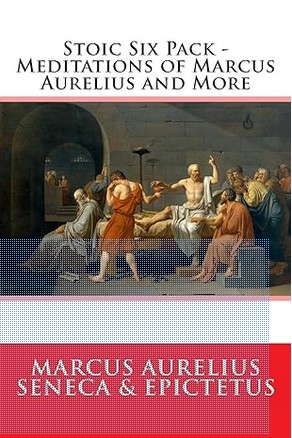
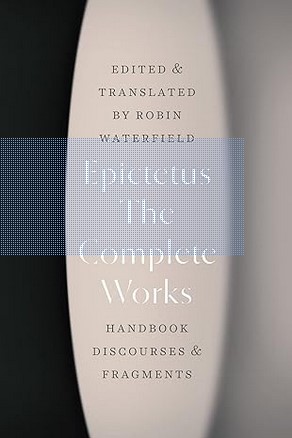
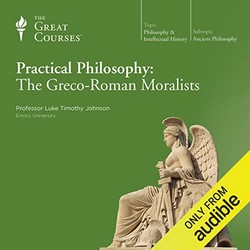
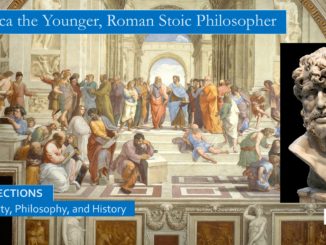
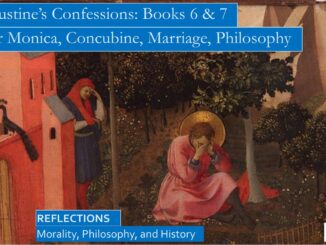

9 Trackbacks / Pingbacks